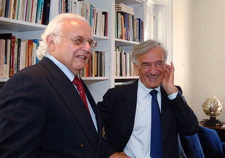Elie Wiesel: Anger and doubt can enrich prayer
Judaic Studies building named in honor of Nobel laureate’s parents

This story was published in BU Today on September 21.
Speaking before an audience of hundreds at the George Sherman Union’s Metcalf Hall Monday evening, September 19, Elie Wiesel told the story of a man — a religious and observant Holocaust survivor — who finds himself unable to pray.
“Day after day,” said Wiesel, “every time he’s about to say, ‘You have loved us very much, oh Lord, You have given us an excess of charity and compassion,’” the man must stop — every word turns into an obstacle for him.
The prayer evokes painful nostalgia for the man’s childhood innocence, explained Wiesel (Hon.’74), a Nobel laureate, a Holocaust survivor, and BU’s Andrew W. Mellon Professor in the Humanities. The man finds himself in a quandary: the world has changed, he has changed, but the prayer has not; the words are the same, as if the Holocaust had not happened, and the man feels that anything he could say to God would be a lie, a betrayal. At the same time that he feels he must praise God’s mercy for his own survival, he remembers those who perished and his desire is stifled; he feels he must refuse God praise and thanksgiving.
Wiesel’s lecture, entitled Why Pray, was the first of BU’s annual Three Encounters with Elie Wiesel lecture series. Earlier in the day, the building that houses the Elie Wiesel Center for Judaic Studies at 147 Bay State Road was named in honor of Wiesel’s parents, Shlomo, who was murdered at Buchenwald, and Sarah, who along with Wiesel’s sister was killed at Auschwitz. Wiesel survived both camps and chronicled the nightmare in his 1956 book Night. The internationally renowned human rights activist and author won the Nobel Prize for Peace in 1986 and has taught at BU since 1976.
In his lecture, Wiesel asserted that “the prayer from which man’s fate is absent, his anguish ignored, is not called prayer.” Rather, people must bring to prayer the fullness of their experience — including doubt, disappointment, or even anger — in order for their prayers to be meaningful.